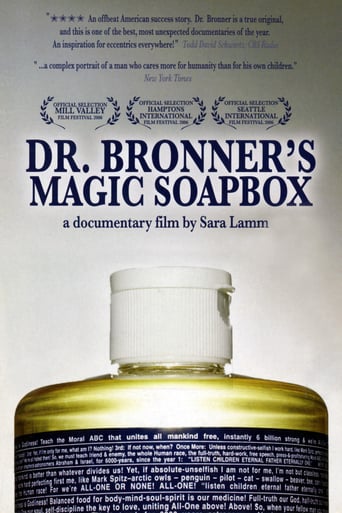tedg
Documentaries are hard to do. Nearly always what the filmmaker encounters is the complexity of life, from which they try to pull a narrative. Most often, that narrative is refined, abstracted from the world to match expectations. The best of these instead challenge our expectations, help us see through the abstraction into another world.Unfortunately here, we have a somewhat interesting character or two plus a filmmaker who clearly invested a lot of time. The result is that we neither have a crisp story or (what would be better) a portal into another world. Our subject is a clearly disturbed man who himself has a crisp albeit simple story and an obsession to tell it, shout it. This story has no depth whatever, is fabricated from misunderstood bits and fabrications and literally has no charm. Yet his endurance is celebrated.Here's what is interesting. Chemistry is the most rational of all sciences, so much so that hardly any chemists are scientists. You learn a few fundamentals, and if you have access to characteristics you can be confident in the results. Most physicians are chemists of this type. The bad news is that they easily believe the entire world works that way. Keep everything clean, put the right stuff in and you cannot avoid success. It leads to bad insights, so what we have here is bad science in its purest form become bad religion.Why does anyone care about Bronner? It isn't because the soap is good (it is), nor that company is now exemplary, nor that he is appealing or even that his message is useful. It is because of the labels. The labels were something. I think it is the first time in modern commerce that an ordinary staple was used as a simple conveyance for an unrelated message. The agenda had nothing to do with the soap. We know this with TeeVee and Google where what we use is different than what they sell, but it seemed in the late 60s that nothing was beyond reach and here was a way to subvert commerce. The label happened to be in our hands just when we had reflective time, so even if the words were banal, the system it established gave hope.All we care about is what is left when we die. Here is a man who abused his kids, yet the most abused one celebrates him. He made no measurable progress in his mission, yet we admire his doggedness. The message is vacuous, yet we elaborate it in our own way. This documentary is muddled, yet we make our own sense of it.Any of us would be so lucky to have such a legacy.
MarieGabrielle
This documentary is shown on Sundance, and is a very interesting study of Dr. Emmanuel Bronner, a former Rabbi and chemist, and also a man who had been diagnosed with a form of manic depression and even institutionalized in the earlier part of his life.His son takes us through the history of this unusual liquid soap, invented by Dr. Bronner on a now billion dollar enterprise, overseen by C.F.O. Trudy Bronner, and several of Bronner's grandsons.My father used to purchase this in the health food stores in the 1970's. It had strange labels with the ABC's of morals, religion and virtue; as a child it was funny to read. The All-One philosophy he writes of is very intriguing. (Yes; you can even buy this at Kroger supermarkets in Ohio; I checked!).This documentary recounts the how and why of Dr. Bronner, why he invented this natural Castile soap. A former chemist, the soap was revolutionary for the time, as it contained no chemicals and came in different fragrances. Peppermint, almond, and even more natural fragrances. I can even remember the blue labels and the different sayings.Toward the last half of the show Dr. Bronner's son visits the Illinois mental institution, bringing samples of the soap for the workers. At the time Dr. Bronner was committed, he was speaking at the University of Illinois, and the Dean had him arrested for his rantings. Overall a very interesting documentary which reflects the unusual life of Dr. Bronner, and how his creativity and passion led to the marketing of his philosophy, and soap. Congratulations to his family and the writer of this documentary, an interesting commentary on unusual people, and how they sometimes are the most creative and inventive, and have a great deal to contribute to society. 10/10.

